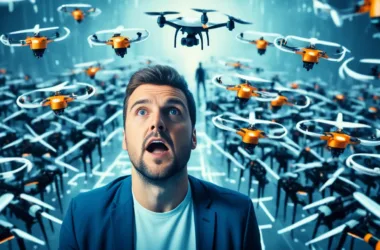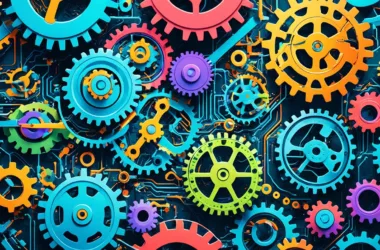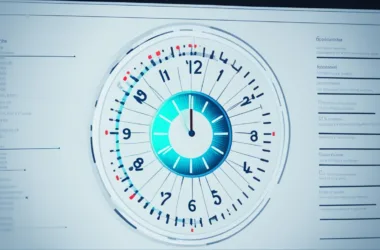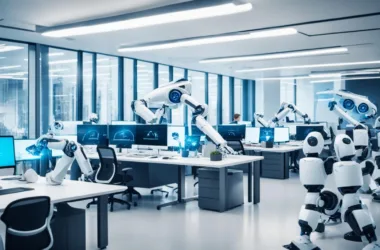Artificial Intelligence (AI) is changing technology and transforming different sectors. But, can AI help make the world a better place? It’s crucial to look at how AI can solve global issues and benefit our communities. As we learn more about AI’s ethical side, we need to use it to make a positive difference.
This article discusses AI for Social Good (AI4SG). It shows how developers can join this cause. We’ll see how AI can tackle big problems and connect to doing good. This is a chance to see how AI can help build a better future.
Let’s discover what AI can do for good causes. We’ll look at the challenges it faces and share success stories. Find out how you can join the AI for Social Good movement and change the world for the better.
Key Takeaways:
- Artificial intelligence (AI) has the potential to drive positive change and address social challenges.
- AI for Social Good (AI4SG) aims to establish partnerships between AI researchers and application-domain experts to work towards the United Nations’ 17 Sustainable Development Goals (SDGs).
- AI can contribute to addressing all 17 SDGs, spanning domains such as crisis response, economic empowerment, education, and more.
- AI capabilities for social good include computer vision, natural language processing, speech and audio processing, and analytics, among others.
- To overcome bottlenecks in AI for social good, accessible and comprehensive datasets and a skilled AI workforce are crucial.
The Role of AI in Addressing Global Challenges
AI, including machine learning, can revolutionize our fight against social and global challenges. It can analyze huge data and find patterns. This helps us achieve sustainable goals and create positive changes.
AI can hugely help in solving social problems. It makes diagnosing diseases quicker and more accurate, improving healthcare. It also aids in disaster relief by analyzing data for an effective response.
AI can tackle many societal issues, improving our lives,” says Dr. Emma Greenfield, an AI expert at the International Institute of Artificial Intelligence. “It allows us to solve complex problems more efficiently.
AI can help achieve the United Nations’ Sustainable Development Goals (SDGs). These goals include reducing poverty, protecting the environment, and providing quality education and gender equality. AI offers creative solutions to these issues, pushing us towards a fair and sustainable future.
However, AI’s full potential for social good is limited by data accessibility. High-quality data is essential for AI’s accuracy. It’s vital, especially in less privileged areas, to make sure AI helps everyone.
Besides, we need more AI experts worldwide. Training a skilled workforce for AI development is crucial. Initiatives in AI education and collaborations between researchers and practitioners can fill this gap. It maximizes AI’s impact on global challenges.
| AI for Social Challenges | AI for Global Problems | AI for Sustainable Development |
|---|---|---|
| Improved healthcare outcomes through accurate disease diagnosis. | Efficient disaster relief efforts through data analysis and insights. | Contribution to achieving the United Nations’ Sustainable Development Goals. |
| Increased accessibility to AI-powered solutions. | Enhanced data accessibility to drive AI applications. | Addressing data gaps to ensure inclusive and equitable development. |
| Development of AI talent and expertise for social good. | Building a skilled AI workforce to tackle global challenges. | Fostering collaboration between researchers and practitioners for maximum impact. |
AI can change how we tackle global challenges and achieve sustainable development. By facing data and talent challenges, we can use AI more for social good. Working together across sectors, AI helps us aim for a fair and sustainable world for everyone.
Mapping AI Use Cases to Social Good Domains
Artificial intelligence (AI) can greatly impact the United Nations’ 17 Sustainable Development Goals (SDGs). By looking into AI use cases for social impact, we see that AI can help meet all 17 SDGs. These cases cover many areas, each aiming for social good and sustainability.
Crisis Response
In crises, AI can greatly support disaster response. It can sift through massive data, predict patterns, and direct resources smartly. This helps reduce the effects of natural and human-made disasters.
Economic Empowerment
AI can push economic empowerment by closing gaps and creating chances. It offers tools and platforms for people and companies in need, giving them access to resources, info, and markets. This leads to growth and better lives.
Education
AI can transform education with personalized and adaptive learning. With intelligent systems, virtual classes, and AI-driven content, education becomes more accessible, equal, and effective.
Environmental Challenges
AI solutions can fight climate change and environmental harm. Through smart grids, precise farming, and predictive models, we can use resources wisely and protect the environment.
Equality and Inclusion
AI can tackle inequalities and boost inclusion. It spots biases in algorithms and makes technology easier for people with disabilities. AI is helping make society fairer and more inclusive.
Health and Hunger
AI can change healthcare and combat hunger. It can diagnose diseases and foresee outbreaks, improving food production and distribution. AI aims to save lives, enhance health, and ensure everyone has food.
Information Verification
AI can fight misinformation and check information’s truth. With tools like natural language processing, it helps in fact-checking and fighting fake news.
Infrastructure Management
Managing infrastructure well is key to growth. AI helps plan cities, manage transport, and run energy grids better. This leads to smarter resource use, fewer emissions, and improved urban life.
Public and Social-Sector Management
AI can make governance and public management better. It enhances decision-making and service delivery in government. AI drives efficient public administration and data-led policies.
Security and Justice
AI tools can boost security and justice. They analyze data for crime prevention, improve legal research, and support courts. AI is crucial for a safe, just society.
Linking AI use cases to social good areas shows its role in sustainable development. Applying AI in these fields can drive positive change, tackle social issues, and aim for the SDGs.
AI Capabilities for Social Good
Artificial intelligence (AI) has a lot to offer in making the world a better place. It uses different technologies to create a big impact. There are several AI features that can help:
- Computer Vision: This lets machines understand pictures and videos. It’s used for identifying things in images and more complex tasks like recognizing faces.
- Natural Language Processing (NLP): NLP helps machines understand and respond to human language. This includes things like figuring out the mood of text, translating languages, and summarizing big pieces of writing.
- Speech and Audio Processing: With this, machines can make sense of spoken words and sounds. It’s useful for recognizing speech, working with voice assistants, and analyzing audio.
- Analytics: AI analytics help us find insights from huge data sets. This includes discovering patterns, making forecasts, and supporting decisions with data.
Using these AI features, developers and groups can solve tough issues. They can make new solutions for big problems. AI can do things like find diseases in images or understand public opinions from social media.
AI Applications for Social Good
There are many ways AI can be used for good. Here are a few examples:
# “Computer vision can help in disaster relief by analyzing satellite images. It finds places that need help fast.”
# “NLP can support education by making personalized learning materials. It also offers interactive ways to learn languages.”
# “Speech and audio processing can make life easier for people with disabilities. It does this through speech recognition systems and voice-controlled tools.”
# “With analytics, public health efforts can get better. It looks at big data to spot disease trends and plan how to respond.”
These ideas show how AI can tackle social challenges and make positive changes.
Overcoming Bottlenecks in AI for Social Good
AI can do a lot for the good of society. But, there are big hurdles in the way, like not enough data and not enough AI experts. We need more data and people who know AI to make a big positive impact.
To fully use AI for global challenges, we must solve key problems:
Data Accessibility
For AI to help society, it needs lots of good, ethically gathered data. This data helps train AI models. Yet, getting this data can be hard because of privacy, who owns the data, laws, and costs.
AI Talent
There’s also not enough people who know how to use AI for good. We need more AI experts who get both the tech and the social impact. Right now, we don’t have enough of these experts, which slows down using AI to help society.
So, how do we fix these issues?
By fostering collaborations between academia, industry, nonprofit organizations, and governments, we can enhance data accessibility and cultivate a skilled AI workforce.
Here’s what organizations and groups can do:
- Build partnerships for better data sharing and responsible data use for social good
- Put money into AI education and training to create a diverse group of experts
- Back projects that make sure AI is developed and used in a fair and inclusive way
If we tackle these challenges together, AI can truly help make the world a better place.
Managing Risks in AI for Social Good
Using artificial intelligence (AI) for social good requires careful risk management. We must think about ethics, responsible AI creation, and following certain rules. This ensures AI can help society effectively.
One main concern is identifying and reducing AI risks. Ethics are key here. They make sure AI’s development and use are fair, accountable, transparent, and inclusive.
Developing responsible AI means making systems that are accurate and fair. These systems should not be biased or unfair. They should use data ethically, keep privacy, and protect important information.
Many groups focus on the ethical and rule-following sides of AI for good. Organizations like the Partnership on AI and the Future of Life Institute set guidelines. These help guide how AI should be developed and used rightly.
Responsible AI development requires continuous collaboration between technologists, policymakers, academics, and civil society organizations. Together, we can navigate the challenges and harness the full potential of AI for social good.
Working together across fields is vital. Ethicists, social scientists, and AI experts must join forces. This way, we ensure the ethical creation, use, and impact of AI on society.
Using responsible AI methods builds trust. Being clear about decisions and results makes the public more likely to accept and use AI for social issues.
Key Ethical Considerations in AI for Social Good
Keep these ethical points in mind when creating AI for good:
- Ensure fairness and reduce bias in collecting data, algorithms, and decisions.
- Make AI systems transparent and explainable for trust and accountability.
- Protect privacy and secure important data all through AI’s use.
- Consider AI’s possible bad effects on jobs, equality, and justice.
- Think about how AI affects society and different cultures.
Addressing these points early helps make AI for good more inclusive and lasting.
| Ethical Considerations | Responsible AI |
|---|---|
| Fairness and Bias | Developing unbiased algorithms and decision-making systems. |
| Transparency | Ensuring AI systems are explainable and accountable. |
| Privacy and Security | Protecting sensitive data throughout the AI lifecycle. |
| Impact on Society | Addressing potential negative impacts on employment, equality, and social justice. |
| Societal and Cultural Implications | Considering the broader implications of AI on society and culture. |
To really make AI work for social good, managing risks and ethics is key. By choosing responsible AI development, we can make sure AI benefits society. This also protects the rights and well-being of everyone involved.
Scaling Up AI for Social Good
We must work together to grow the use of AI for doing good in society. AI has the power to make big positive changes. But, we need to use it more in the real world to see its full benefits.
Using AI more in areas like healthcare, education, and the environment is key. This can help solve big problems and make a lasting difference. It’s important to increase how much we use AI solutions in these areas.
But, growing AI for good isn’t easy. We have to make sure we have enough data and the right people to work with AI. This ensures AI can really help where it’s used.
Challenges in Scaling Up AI for Social Good
1. For AI to work well, it needs lots of different data. Working with groups that have this data can help solve this issue.
2. We also need more folks who know how to use AI well. Creating more AI learning and training opportunities is a good step.
3. Good technology and connections are a must for AI to reach more places. Putting money into better tech can solve this problem.
By fixing these issues, we can use AI to really make a difference in the world. It’s about making positive changes everywhere.
| Benefits of Scaling Up AI for Social Good | Challenges to Address |
|---|---|
|
|
Successful Collaborations for AI for Social Good
Guidelines that help AI researchers and application-domain experts work well together have been found. It’s through thorough discussions across different fields. True progress is made when tech experts join hands with domain experts. This includes NGOs and local authorities. Together, they tackle social challenges using AI to make a real difference.
When experts from various fields team up, it sparks innovation. This approach allows for solving problems by combining tech know-how with a deep understanding of social settings. This mix is key when applying AI solutions.
Teaming up AI researchers with application-domain experts brings new solutions. It makes sure AI advances with a keen eye on real-world needs and hurdles of different areas.
AI researchers know how to build and use AI tech. Experts in specific fields understand the social issues at hand. Combining these strengths, they tailor AI to address each social challenge uniquely.
For collaboration to work, communication and respect between AI researchers and domain experts are vital. They must share goals and understand each other. This builds trust and keeps everyone on the same page.
Working together also means AI can smoothly become part of existing setups. This ensures AI efforts are woven directly into the areas they aim to help.
Benefits of Successful Collaborations for AI for Social Good
Working together brings many wins in the realm of AI for social good:
- AI experts learn about specific areas. This helps them craft better solutions for social issues.
- Experts in those areas can use the tech skills of AI researchers. This boosts their impact and reach.
- Such teamwork leads to AI solutions that truly fit the needs and challenges faced.
- By combining their strengths, they greatly increase AI’s power to drive positive change in society.
Joining AI researchers with domain experts is key to making a difference with AI in social challenges. Only through teamwork can AI for social good hope to have a significant, lasting effect. Together, they pave the way for a brighter future for communities around the world.
Real-Life Examples of AI for Social Good
Many real-life examples show AI’s positive impact in various areas. They show how AI can help solve big society issues.
1. Combatting Online Abuse Against Women
AI is used to fight online abuse towards women. It analyzes lots of data to find and sort abusive content. This helps make the internet a safer place for everyone.
2. Monitoring Agricultural Diseases
AI tools monitor and predict farm diseases. They use smart tech to spot crop diseases early. This helps farmers act fast, saving crops and promoting sustainable farming.
3. Predicting Poverty
AI models predict poverty and find areas in need. They look at different data, like satellite images and economic info. This helps send help where it’s needed most.
4. Combating Climate Change
AI is key in fighting climate change. It uses data to create accurate weather models. This helps predict extreme weather and plan for a sustainable future.
AI4SG Projects
These examples are just part of the AI for social good movement. They use AI to tackle big problems and improve lives. It’s about making a positive change for everyone.
| AI Use Case | Domain | Positive Social Impact |
|---|---|---|
| Combatting online abuse against women | Social media | Creation of safer online spaces, fostering inclusivity and respect |
| Monitoring agricultural diseases | Agriculture | Reduced crop damage, improved productivity, sustainable farming practices |
| Predicting poverty | Social and economic development | Targeted interventions, effective resource allocation, poverty alleviation |
| Combating climate change | Environmental sustainability | Accurate climate models, climate adaptation strategies, resilient future |
Partnering with Change-Makers: AI for Social Good Initiatives
AI for Social Good initiatives are key in creating positive social change. Google’s AI for Social Good program is a prime example. It unites researchers, engineers, and volunteers focused on making a real difference in underserved communities. They work with change-makers and organizations to create data-driven solutions.
Google’s initiatives use artificial intelligence to improve lives and build a more inclusive future. Through these partnerships, innovation blooms. They blend technology with local insights to find lasting solutions.
These efforts are dedicated to making a positive impact across the spectrum. They use AI to help marginalized groups, promote sustainability, and tackle big issues. Issues like poverty, climate change, education, and healthcare are their targets.
AI for Social Good initiatives combine tech and social responsibility. They work with change-makers to use AI for real-world benefits.
These efforts lead to groundbreaking AI solutions and push for ethical AI use. They stress the importance of transparency, fairness, and accountability. This way, they build trust and ensure their impact is positive.
The collaboration between AI experts and organizations is growing. This unity strengthens their mission to use AI for good. It encourages sharing ideas, spreading technology, and supporting those who need it most.
Together, these initiatives and their partners use technology for significant change. They are dedicated to empowering people and communities everywhere.
The Importance of Ethical Design and Governance in AI for Social Good
Ethical design and governance are key in AI for social good. We need to make AI responsibly to keep our values of care and positive change. This ensures AI helps rather than harms society.
To do this right, developers must think of the ethics and follow AI rules. They need to make sure AI is legal, clear, strong, and accountable. This way, AI helps everyone and doesn’t cause harm or bias.
Groups have been formed to support ethical AI use. They offer guidelines to help developers. This ensures AI solutions are responsible and align with ethical norms.
Adding ethics into AI design and use lessens risks. It also makes sure AI brings good changes to society. Ethical design means fairness, including everyone, and no discrimination. It stops AI from being biased or increasing social inequalities.
AI governance frameworks check on AI development and use. They make sure AI follows ethical rules and answers to the public. These frameworks cover transparency and let users have control over AI systems.
Using ethical rules in AI builds trust with everyone involved. This includes users and the law. It makes AI more accepted and supports innovation that helps society while respecting values.
The Role of AI Principles
AI principles guide ethical AI design and governance. These principles share key values for developers to consider when making AI tools.
These principles address fairness, clarity, privacy, accountability, and safety. They ensure AI protects human rights, prevents bias, keeps user data safe, and is transparent in decisions.
By using these principles, developers show their commitment to ethical AI. This helps build a culture of ethical AI worldwide.
The Power of Social Responsibility
AI for social good is based on social responsibility. Developers and groups must use AI to benefit society and push for good changes.
AI can help solve big social issues, like better healthcare, education, and saving our planet. When used right, AI can boost human efforts and bring revolutionary solutions.
But, it’s crucial to remember that AI is not a cure-all. Ethical guidelines help reduce risks and make sure AI helps society without hurting individual rights or causing harm.

In conclusion, ethical design and governance are vital for AI’s success in social good. By sticking to ethical principles, developers can use AI in a caring and responsible way. This supports positive social changes and tackles global issues with empathy and understanding.
Conclusion
The power of AI for Social Good (AI4SG) is huge. It can create big changes and solve social problems. We need to use AI responsibly and follow ethical rules.
Working together is key for success. AI experts and domain experts must join forces. This way, we can meet the needs of communities and help achieve the United Nations’ Sustainable Development Goals.
Programs like AI for Social Good show we can use AI for good. With the support of organizations like Google’s AI for Social Good, we can face social issues. By promoting teamwork and responsible AI, we aim for a brighter future for everyone.






